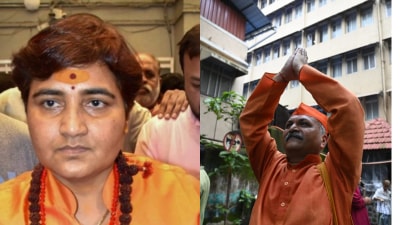Well-educated women shouldn’t remain idle just to seek alimony from husband: Delhi HC
The Delhi HC also noted the evidence -- it was shown that the woman had been an Audit Associate at KPMG Dubai with subsequent work as a Human Resources Manager in her father’s business, and has an entrepreneurial venture importing semi-precious jewellery.
 The court also relied on WhatsApp chats, as were referred to by the family court, where the woman’s mother had advised that employment would jeopardise the woman’s alimony claims. (File Photo)
The court also relied on WhatsApp chats, as were referred to by the family court, where the woman’s mother had advised that employment would jeopardise the woman’s alimony claims. (File Photo)A well-educated wife, with experience in a suitable and gainful job, ought not to remain idle solely to gain maintenance from her husband, the Delhi High Court has held.
The court made the observation while hearing a revision petition by a woman, who challenged a family court order of November 2022 dismissing her claim for interim maintenance from her estranged husband.
Justice Chandra Dhari Singh, in the order dated March 19, held, “This court is of the view that qualified wives, having the earning capacity but desirous of remaining idle, should [not] set up a claim for interim maintenance. Section 125 of the CrPC carries the legislative intent to maintain equality among spouses, provide protection to wives, children and parents, and not promote idleness. In light of the same, this court is of the considered view that a well-educated wife, with experience in a suitable gainful job, ought not to remain idle solely to gain maintenance from her husband.”
The HC refused to interfere with the family court’s order and recorded that the court “encourages the petitioner (woman) to actively look for a job to become self-sufficient as she already has wide exposure and is aware of worldly affairs, unlike other women who are not educated and completely dependent upon their spouses for basic sustenance… This court is unable to comprehend the fact as to why, despite being able-bodied and well qualified, the petitioner has chosen to remain idle since her return to India.”
The woman got married in December 2019 and, within weeks, shifted to Singapore with her spouse. It was the woman’s case that she worked from 2005 to 2007 in Dubai and was never gainfully employed thereafter, including at the time of her marriage.
Justice SIngh’s order, however, notes, “… this court cannot ignore the fact that the petitioner is admittedly a well-qualified and able-bodied person. Furthermore, the whole situation where the petitioner was staying with her parents and now with her maternal uncle indicates she wants to convince the court that she is unable to earn… The fact that the petitioner possesses a Masters degree in International Business from the University of Wollongong, Australia, which has not been denied by the petitioner either before the court below or before this court, plays a major role as the same speaks about her capacity to earn and maintain herself.”
The court also relied on WhatsApp chats, as were referred to by the family court, where the woman’s mother had advised that employment would jeopardise the woman’s alimony claims. The HC observed that such an action “strongly suggests a deliberate attempt to remain unemployed to seek maintenance claims”.
The Delhi HC also noted the evidence presented before the family court, where it was shown that the woman had been an Audit Associate at KPMG Dubai with subsequent work as a Human Resources Manager in her father’s business, and has an entrepreneurial venture importing semi-precious jewellery.
“… it has been rightly observed by the learned Principal Judge that while the petitioner claims she cannot sit idle and is trying to search for a job, she has not placed any evidence on record regarding her efforts to secure employment or resume her business activities either before the court below or before this court. Accordingly, this court is of the considered view that the mere assertion of job-seeking, without corroborative evidence, is insufficient to establish genuine efforts at self-sufficiency,” the court observed.












